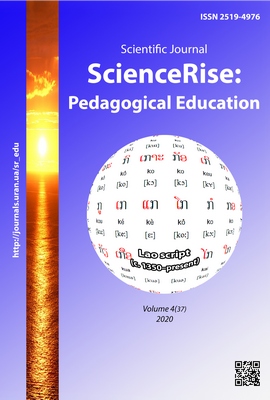Perceived features of practicum effectiveness and acquired professional competences among graduate class students in Dilla University
DOI:
https://doi.org/10.15587/2519-4984.2020.206234Keywords:
Practicum, Perceived practicum effectiveness, host organization, profession acquired professional competenceAbstract
Background: Even though practicum is required to integrate and apply acquired theories, skills, and knowledge recently, there is a huge disparity between types of skills and knowledge, taught in pre-service programs and the realities of work place practice.
Objective: The objective of the study was to examine perceived features of practicum effectiveness and acquired professional competence of graduate class students.
Methods: The quantitative research approach with descriptive design was employed. Total of 169 graduate class students of Dilla University were selected through multistage sampling. Questionnaires were used as tools of data collection. Mean, standard deviation, person correlation and one-way ANOVA were used to analyze the data.
Result: The result revealed that the readiness for future work was (M=2.0809, SD=58024), creativity enhancement (M=1.7678, SD=.61876), and practice of the learned concept (M=2.1302, SD=.42897) respectively. With regard to graduate students, acquired the professional competence: student’s knowledge, skills and ethics that students, gained from the field trip, were (M=2.0000, SD=.48659), (M=2.1550, SD=.43300), and (M=1.9172, SD=.48428) respectively. Further, person correlation analysis showed that perceived features of practicum effectiveness and acquired professional competence were moderately positively correlated r (169) = 0.367, p < 0.05. Besides the result, demonstrated by one-way ANOVA, there was a statistically significant difference in students’ satisfaction with practicum education host organization services, in that Psychology students (F(11,11) = 3.477, p = .025), and Journalism students(F(8,5) = 5.747, p = .035) respectively.
Conclusion: Practicum is/was less effective in enhancing student’s creativity and ethics. Thus, Universities, and host organizations have to work to promote students’ professional competence
References
- Williamson, S., Hostetter, C., Byers, K., Huggins, P. (2010). I Found Myself at this Practicum: Student Reflections on Field Education. Advances in Social Work, 11 (2), 235–247. doi: http://doi.org/10.18060/346
- Barbarash, D. (2016). Knowledge and skill competency values of a university managed cooperative internship program: A case study in design education. Asia-Pacific Journal of Cooperative Education, 17 (1), 21–30.
- Chen, R. K., Nguyen-Finn, K. L., Park, J. (2018). Effectiveness of Practicum Supervision as Perceived by Hispanic Undergraduate Rehabilitation Services Students. Journal of Applied Rehabilitation Counseling, 49 (4), 14–20. doi: http://doi.org/10.1891/0047-2220.49.4.14
- Bartual-Figueras, M. T., Purroy-Sanchez, P., Turmo-Garuz, J. (2019). Practicum and development of professional competences. the case of business students. EDULEARN19 Proceedings. doi: http://doi.org/10.21125/edulearn.2019.0768
- Allen, J. M., Wright, S. E. (2013). Integrating theory and practice in the pre-service teacher education practicum. Teachers and Teaching: theory and practice, 20 (2), 136–151. doi: http://doi.org/10.1080/13540602.2013.848568
- Tuli, F. (2010). Understanding Undergraduate Students Practicum Experience: A Qualitative Case Study Of Jimma University. Ethiopian Journal of Education and Sciences, 5 (1). doi: http://doi.org/10.4314/ejesc.v5i1.56311
- MoE (2003).Teacher Education system Overhaul (TESO) document. Addis Ababa.
- Guerrero, D., De los Ríos, I. (2012). Professional Competences: a Classification of International Models. Procedia – Social and Behavioral Sciences, 46, 1290–1296. doi: http://doi.org/10.1016/j.sbspro.2012.05.290
- Meijer, P. C., de Graaf, G., Meirink, J. (2011). Key experiences in student teachers’ development. Teachers and Teaching: theory and practice, 17 (1), 115–129. doi: http://doi.org/10.1080/13540602.2011.538502
- Guerrero, D., De los Ríos, I. (2012). Professional Competences: a Classification of International Models. Procedia – Social and Behavioral Sciences, 46, 1290–1296. doi: http://doi.org/10.1016/j.sbspro.2012.05.290
- Cohen, L., Mansion, L., Morrison, K. (2011). Research methods in education. New York: Routledge.
- Chen, R. K., Nguyen-Finn, K. L., Park, J. (2018). Effectiveness of Practicum Supervision as Perceived by Hispanic Undergraduate Rehabilitation Services Students. Journal of Applied Rehabilitation Counseling, 49 (4), 14–20. doi: http://doi.org/10.1891/0047-2220.49.4.14
- Mgaya, K., Mbekomize, C. (2014). Benefits to host organizations from participating in internship programs in Botswana. Asia-Pacific Journal of Cooperative Education, 15 (2), 129–144.
- Jean, C., Kawai, H., Rong, H., Chi, O., Yi, S. (2012). Internship satisfaction: a preliminary study on undergraduates from the faculty of business and finance of Universiti Tunku Abdul Rahman. Available at: http://eprints.utar.edu.my/616/1/BA-2011-0905921.pdf
- Aboomar, R., AlJazi, S., Alhasanat, H. (2018). Evaluation of Teaching Practicum at the College of Educational Sciences from the Viewpoints of Student Teachers at Al-Hussein Bin Talal University (AHU). Journal of Studies in Education, 8 (2), 45. doi: http://doi.org/10.5296/jse.v8i2.12846
Downloads
Published
How to Cite
Issue
Section
License
Copyright (c) 2020 Getachew Abeshu, Dinaol Urgessa, Abebe Sintayehu

This work is licensed under a Creative Commons Attribution 4.0 International License.
Our journal abides by the Creative Commons CC BY copyright rights and permissions for open access journals.
Authors, who are published in this journal, agree to the following conditions:
1. The authors reserve the right to authorship of the work and pass the first publication right of this work to the journal under the terms of a Creative Commons CC BY, which allows others to freely distribute the published research with the obligatory reference to the authors of the original work and the first publication of the work in this journal.
2. The authors have the right to conclude separate supplement agreements that relate to non-exclusive work distribution in the form in which it has been published by the journal (for example, to upload the work to the online storage of the journal or publish it as part of a monograph), provided that the reference to the first publication of the work in this journal is included.







